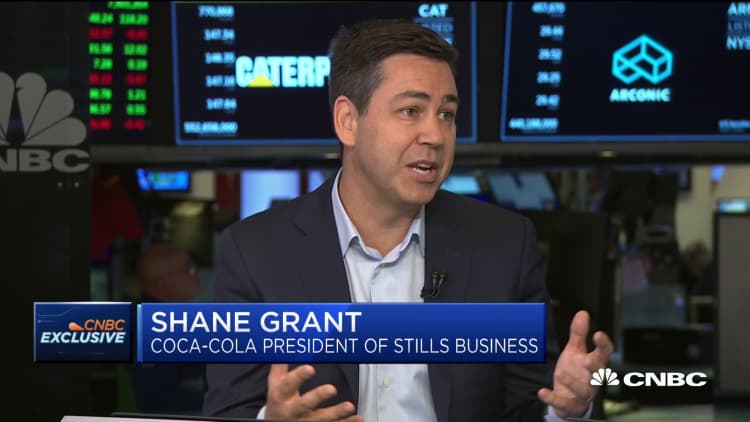As bottled water's sales growth flattens, the world's largest bottled-water maker is betting on new products to try to make water exciting again.
New products from Nestle slated for 2020 launches include an energy water drink and mineral-infused bottled waters.
Poland Spring energy water, a canned sparkling water drink that relies on the name recognition of the billion-dollar brand, contains the same amount of caffeine as a cup of coffee but uses green tea extract instead as its caffeine source.
"Customers are telling us that they're kind of in an energy crisis, that they need a boost and are looking for help with hydration but sometimes water doesn't cut it," Yumi Clevenger-Lee, chief marketing officer of Nestle Waters North America, said in an interview. "They need that morning or afternoon burst of energy to keep them going, so this is really based on the idea of gentle caffeine."
Nestle isn't the only company coming to market with a caffeinated water brand. In March, Coca-Cola plans to launch AHA, flavored sparkling water with caffeine.
Meanwhile, Nestle Pure Life Plus, its first push into functional waters, will launch in February 2020 with three varieties: magnesium, zinc and potassium. Unlike traditional sports drinks, Nestle Pure Life Plus will come without artificial sweeteners or sugar.
"Most of the functional beverages today are either really plain, like alkaline water, or they go the other end of the spectrum — very high sugar, the colors and all of these other things," Clevenger-Lee said.
Bottled water, once the fastest-growing drink category, has seen its growth slow. The NPD Group expects that the number of consumers who sit down at a meal with a bottle of water (also known as the share of eatings) in 2019 will be equal to that in 2017.
Now the fastest-growing category is tap or filtered water, as consumers turn to using reusable water bottles out of growing concern about the environmental impact of single-use plastic.
Nestle has seen the impact of the backlash. During the first nine months of 2019, its global water volumes fell 2.2%, and North American organic sales of water were flat. By contrast, water volumes surged 7.2% during the first nine months of 2015.
In October, Nestle announced an overhaul to its water business, breaking up the unit by geographies, effective Jan. 1. The change is meant to help the company respond more quickly to changing consumer preferences.
Still, Nestle isn't walking away from bottled water. Next year, it also plans to launch Poland Spring Origin, an extension of the water brand ubiquitous in the Northeast, nationwide. The company has also pledged to sell its Poland Spring still bottled water in less than one-gallon containers in completely recycled plastic bottles by 2022.



